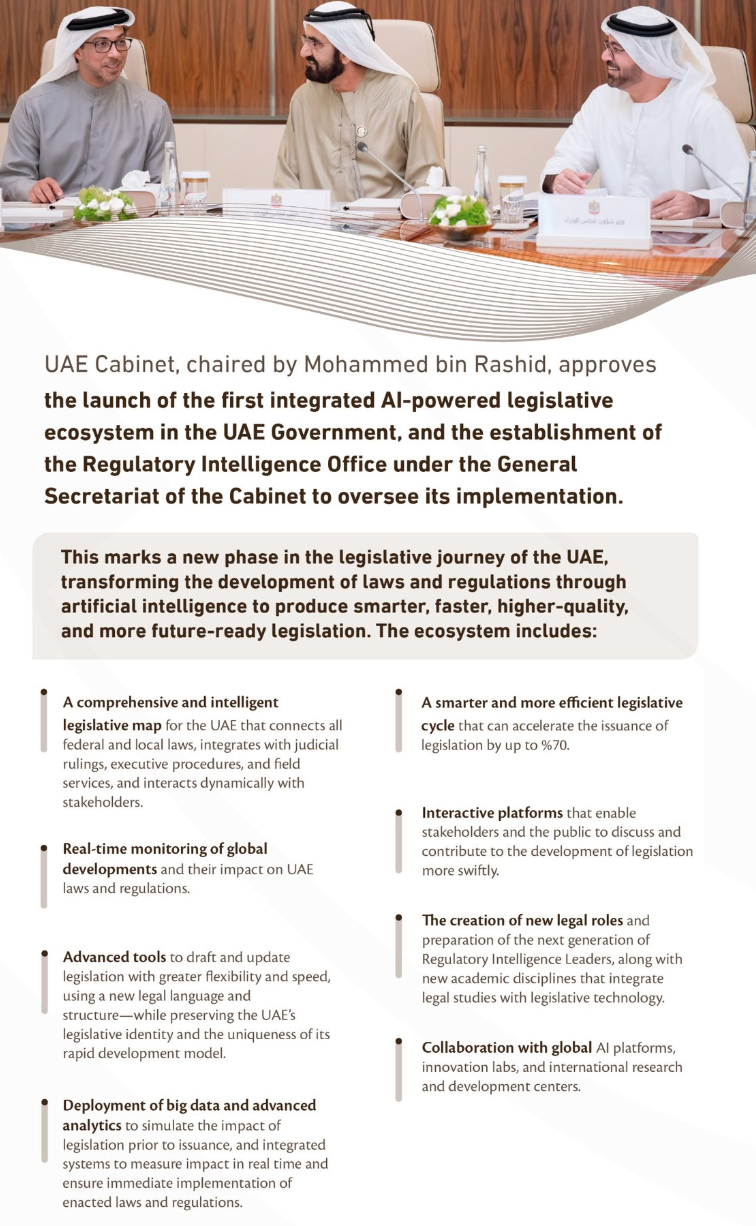UAE bets big on AI to literally rewrite the rules

The United Arab Emirates is rolling out an AI-driven legislative framework designed to analyze and update laws in real time. The state is calling it "a new phase in the legislative journey of the UAE."
According to a report from the Financial Times and a statement from the UAE government, the country is planning to use artificial intelligence not just to streamline bureaucracy, but to actively draft new laws and review existing ones. While most governments are still piloting AI for back-office tasks, the UAE wants AI in the driver’s seat of legislation.
"This new legislative system, powered by artificial intelligence, will change how we create laws, making the process faster and more precise," Sheikh Mohammed bin Rashid Al Maktoum, ruler of Dubai and vice president of the United Arab Emirates, said in state media and on Linkedin.
A legal system that updates itself
At the core of the plan is a massive data infrastructure project, pulling together federal and local laws, court decisions, and public administrative data. The idea is for AI systems to regularly propose amendments and updates to existing statutes, keeping the law in sync with economic and social changes.
To manage the process, the government has established a new agency called the Regulatory Intelligence Office. The group's role is to coordinate both the technical development of the AI infrastructure and its integration into the legal framework. Officials say the system will also draw from international research institutions, allowing the UAE to compare its legal code with international norms and adopt best practices.

The goal is speed. By using AI, the UAE expects to cut the legislative process time by as much as 70 percent, mostly by automating the heavy lifting—from analysis to drafting to implementation. The hope is to free up human resources and move away from slow, manual legal research, accelerating the pace of reform.
Of course, automating legislation is a high-stakes move: legal decisions have broad social consequences and demand deep context, ethical reasoning, and careful interpretation. There’s also the risk of bias—AI systems are only as good as their training data, and flawed data could result in discriminatory or simply bad proposals.
The legislative push is just one piece of a broader strategy to digitize government and cement the UAE’s status as a global AI leader. In 2024, the country launched MGX, an investment arm focused squarely on artificial intelligence. Take, for example, MGX’s role in a $30 billion infrastructure fund that brings together BlackRock and Elon Musk’s xAI, as well as its involvement in building a massive new AI campus in France.
MGX is overseen by Sheikh Tahnoon bin Zayed al-Nahyan, who also heads up G42, the UAE’s major AI conglomerate, which has partnerships with OpenAI, Microsoft, and Cerebras.
Per a PwC study from 2024, the UAE is currently out in front as the Middle East’s tech leader, with AI projected to add up to $96 billion to its GDP by 2030.
AI News Without the Hype – Curated by Humans
As a THE DECODER subscriber, you get ad-free reading, our weekly AI newsletter, the exclusive "AI Radar" Frontier Report 6× per year, access to comments, and our complete archive.
Subscribe nowAI news without the hype
Curated by humans.
- Over 20 percent launch discount.
- Read without distractions – no Google ads.
- Access to comments and community discussions.
- Weekly AI newsletter.
- 6 times a year: “AI Radar” – deep dives on key AI topics.
- Up to 25 % off on KI Pro online events.
- Access to our full ten-year archive.
- Get the latest AI news from The Decoder.